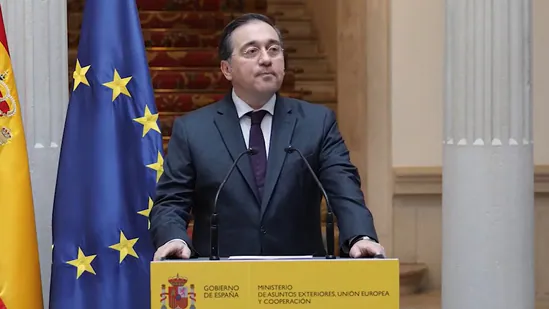Spain has taken a historic step by becoming the first European nation to seek approval from a United Nations court to join South Africa’s lawsuit accusing Israel of genocide in Gaza. This move signifies Spain’s firm stance on the ongoing conflict and its commitment to addressing alleged human rights violations. The lawsuit, initiated by South Africa at the International Court of Justice (ICJ) late last year, accuses Israel of violating the 1948 U.N. Genocide Convention through its military actions in Gaza. The ICJ has directed Israel to immediately cease its military operations in Rafah, a city in southern Gaza, but has not mandated a ceasefire for the region. Despite the court’s directive, Israel has not complied and appears unlikely to do so.
Spanish Prime Minister Pedro Sánchez affirmed Spain’s position, stating, “There should be no doubt that Spain will remain on the right side of history.” On Thursday, Spain announced it would apply to the United Nations’ top court to join South Africa’s case. Spanish Foreign Minister Jose Manuel Albares emphasized, “Our sole goal is to put an end to the war and to advance on the road of applying the two-state solution.” Spain’s request to join the lawsuit aligns it with 12 other countries that have expressed similar concerns. This development underscores a significant shift in Europe’s approach to the Israel-Palestine conflict, with Spain leading the charge. This move comes amidst a backdrop of escalating violence and a severe humanitarian crisis in Gaza.
The ICJ, established after World War II to settle disputes between states, ordered Israel last Friday to allow U.N.-mandated investigators to look into the genocide accusations. Furthermore, on January 26, the ICJ ordered Israel to take all necessary measures to prevent genocide during its military operations in Gaza. South Africa has called for the ICJ to issue new emergency measures, citing the humanitarian crisis in Gaza as a critical concern. On May 24, the court ordered Israel to halt its offensive in Rafah and to keep the border crossing open for aid, as well as to ensure the immediate release of hostages taken by Hamas on October 7.
The ongoing conflict has resulted in significant casualties. According to Israeli estimates, the October 7 attack by Hamas resulted in the deaths of approximately 1,200 people and the capture of over 250 hostages. In retaliation, Israel launched a military campaign in Gaza, which has led to the deaths of more than 36,700 Palestinians, including 15,571 children, according to Gaza government media office. The humanitarian impact of the conflict is severe. The blockade and bombardment have led to a catastrophic humanitarian crisis, with widespread malnutrition and a collapsed healthcare system. UNICEF reports that nine out of ten Palestinian children in Gaza are living in severe food poverty, surviving on diets comprising two or fewer food groups per day – one of the highest percentages ever recorded.
Spain’s decision to join the lawsuit is a critical step towards holding Israel accountable for its actions in Gaza. It sends a strong message that the international community will not turn a blind eye to alleged systematic violations of children’s rights and other human rights abuses. The ICJ’s involvement aims to prompt stricter measures, potentially including arms embargoes and sanctions, against Israel.
However, this move is not without its challenges. Israeli officials have vehemently opposed the ICJ’s decision, with Israeli Ambassador to the UN Gilad Erdan describing the move as “outrageous and wrong.” Foreign Minister Israel Katz also condemned the decision as “shameful” and warned of potential repercussions for Israel’s relationship with the United Nations. Spain, along with Ireland and Norway, recently recognized the state of Palestine, joining over 140 countries in this recognition. This decision has provoked an angry reaction from Israel, which continues to deny allegations of genocide. Despite the political and diplomatic backlash, Spain remains steadfast in its commitment to addressing the humanitarian crisis in Gaza and advancing a peaceful resolution through legal means.
The road to accountability is fraught with diplomatic hurdles. As Spain joins South Africa in this landmark case, the international community watches closely. The ICJ’s final decision could take years, but the preliminary hearings have already set the stage for a prolonged legal battle. The goal remains clear: to ensure justice and protection for the most vulnerable, even in the face of complex geopolitical tensions. Spain’s involvement in this case highlights the increasing willingness of European nations to take a stand on human rights issues in the Middle East. As the conflict continues to rage, the need for a comprehensive and just solution becomes ever more urgent. The actions taken by Spain and other countries could pave the way for more robust international interventions aimed at securing peace and upholding human rights in Gaza and beyond.
















